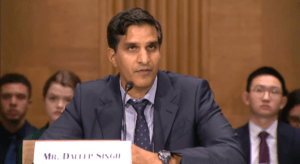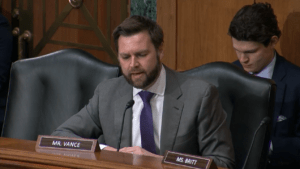The Senate Banking Committee had a marathon hearing on Feb. 28 to discuss export controls and sanctions and whether these tools are working. Roughly half of the debate was centered on Russia, now in its full year of facing its worst-ever U.S. and European sanctions regime.
But the rest of the discussion focused on the government’s export restrictions on computer hardware being sold to Chinese tech companies. Were those controls having their desired effects? The Senate Banking Committee asked its witnesses for their assessment.
“We must use the tools we have to deter or disrupt behavior that undermines our economy,” said Committee chairman Sherrod Brown (D-OH) during his opening remarks at the hearing titled Advancing National Security and Foreign Policy Through Sanctions and Export Controls. “We need to do that while we strengthen our partnership with countries that share our values for democracy and free markets. And we need to do that while not harming U.S. economic and technological leadership,” Chairman Brown said.
The latter part of his opening remarks is the real crux of the story. One of the biggest problems with export controls on China is that other countries, including those in Europe and Asia, will step in and sell, or re-sell, similar components, or the exact product being restricted.
The U.S. imposed these restrictions out of concern that – coupled with decades of IP theft by China – access to high-end computer hardware would only speed up China’s rise as a semiconductor powerhouse. Semiconductors are one of the U.S.’s most important exports. Many see China taking over this market in short order, hence export controls and last year’s passing of the CHIPS Act, which provides tax incentives to make semiconductors in the U.S.
Some witnesses said the White House’s “work with allies” approach was as necessary as it is hard, and said the different Executive Branch departments, like Commerce, Treasury, and State, needed to work together on these measures. There is a “too many chefs spoil the soup” notion in the Senate about how these restrictions are being conducted.
 “Congress should support administration efforts to radically harmonize and simplify the defense trade and dual-use rules buying among, between close allies Australia, the U.K., Canada and the United States,” said Kevin Wolf, former assistant secretary of export administration at Commerce. “This is going to be really quite hard,” he said about ally agreements on countering China.
“Congress should support administration efforts to radically harmonize and simplify the defense trade and dual-use rules buying among, between close allies Australia, the U.K., Canada and the United States,” said Kevin Wolf, former assistant secretary of export administration at Commerce. “This is going to be really quite hard,” he said about ally agreements on countering China.
The current export control system of U.S. allies was established in the 1990s to focus on items of direct relevance to producing, developing or using weapons of mass destruction or conventional weapons. They were not designed to target cloud computing, quantum computing, facial recognition software for dual-use – both military and civilian – drones, and semiconductors used in telecom systems of all types, both consumer and industrial.
During the Q&A, Sen. Bill Hagerty (R-TN) asked Wolf if restrictions should be increased.
“You’re the only witness here today that’s worked at the Commerce Department’s Bureau of Industry and Security (which devises and manages export controls). Do you think it’s appropriate for this administration to allow U.S. technologies to be exported to China, technologies that advance the People’s Liberation Army’s military modernization efforts?” Hagerty asked, singling out China’s space programs.
Wolf said “of course not” and added that there has been a comprehensive embargo on the export of space-related tech items to China for decades. He said the problem with new export controls for computer hardware is all on the ally side of the equation.
“With respect to otherwise commercial civilian technologies, in order to increase the effectiveness of the restrictions you have to get items that are made outside the U.S. subject to comparable controls,” Wolf said.
Hagerty asked Wolf, “How would you suggest the Bureau of Industry and Security (BIS) step it up and stop the flow of technology that’s going to China right now?”
“One way is through the regular investigation of the parties that you’re referring to (ally nations) and using the (BIS) Entity List (export controls list) aggressively once the evidence is identified of somebody providing support for these restricted products,” Wolf said. “Since the U.S. doesn’t have a monopoly on the inputs that are needed for all high tech manufacturing, you have to continue working with the allies to share information, evidence, declassified intelligence, so that those countries understand and see the threat in the same way as we do,” Wolf told Hagerty.
He said export restrictions were working against Huawei, the largest 5G telecommunications company in the world. But added, “There’s a lot more to be done.”
Daleep Singh, former deputy national security advisor for international economics inside the Biden White House – and one of the chief architects for the Russia sanctions – also touted the need to work with allies on export controls.
 When thinking about further restrictions on China, he said, the White House and Congress have to consider “What is the objective? Is it deterrence? Is it to degrade the target’s ability to project power and exert influence? Is it to maximize costs? Is it a demonstration effect? Is it to fire a warning shot? Depending on the objective and the strategy, we can then have an analysis-driven understanding of how our strengths intersect with the target’s vulnerabilities. And it’s from that point that you choose tools. Some of these will be negative correspondence devices like sanctions, export controls, tariffs, entity listings. Others can be positive inducements to win the narrative with countries that would have to join a coalition in support of export restriction,” Singh told the Committee.
When thinking about further restrictions on China, he said, the White House and Congress have to consider “What is the objective? Is it deterrence? Is it to degrade the target’s ability to project power and exert influence? Is it to maximize costs? Is it a demonstration effect? Is it to fire a warning shot? Depending on the objective and the strategy, we can then have an analysis-driven understanding of how our strengths intersect with the target’s vulnerabilities. And it’s from that point that you choose tools. Some of these will be negative correspondence devices like sanctions, export controls, tariffs, entity listings. Others can be positive inducements to win the narrative with countries that would have to join a coalition in support of export restriction,” Singh told the Committee.
Sen. Mark Warner (D-VA) asked about China investments in the U.S. and wondered if that could be limited. While he did not spell out the investments he was talking about, on the new tech side, China is a huge investment partner in Silicon Valley.
“The technology competition with China will be where our future will be decided,” Warner said.
Limiting foreign investment coming into the U.S. is the purview of the Committee on Foreign Investment in the US (CFIUS) Process.
Another process that Washington is looking into is known as the reverse CFIUS. This only exists rhetorically as of yet, but encompasses the conversations and policy proposals of outbound investment review of American companies and would assess outbound capital flows to foreign adversaries like China.
“One of the tools that the administration and Congress have been considering to influence our economic relationship with China is an outward-bound investment screening mechanism. And some have referred to it as a reverse CFIUS. As an individual who oversaw CFIUS, let me tell you that you have to focus on national security while promoting foreign investment. It’s not a balance. It’s both. To me, this means you have to minimize the opportunity for politicizing foreign transactions,” warned Clay Lowery, former assistant secretary for international affairs at the Treasury Department. “You have to keep CFIUS narrowly focused on national security.”
Warner hopped on that one: “We are just playing whack-a-mole over here,” he said.
 New Senator J.D. Vance asked the three witnesses about what the government was taking into consideration when devising its sanctions policy and China export controls.
New Senator J.D. Vance asked the three witnesses about what the government was taking into consideration when devising its sanctions policy and China export controls.
He was alluding to the unintended consequences of both actions and promoting a different strategy – one of shoring up American economic resilience at home to reduce dependencies on foreign adversaries.
“When you guys were thinking about designing these sanctions, I wonder if you may be underweighting and understating the importance of manufacturing, mining, and the sectors of the economy that are much more important when you’re developing a war economy than finance or technology, especially digital technology,” he said. “These are the sectors of the economy that matter if you’re going to be on war footing.”
Senate Banking Committee Asks if Export Controls Against China are Working
The Senate Banking Committee had a marathon hearing on Feb. 28 to discuss export controls and sanctions and whether these tools are working. Roughly half of the debate was centered on Russia, now in its full year of facing its worst-ever U.S. and European sanctions regime.
But the rest of the discussion focused on the government’s export restrictions on computer hardware being sold to Chinese tech companies. Were those controls having their desired effects? The Senate Banking Committee asked its witnesses for their assessment.
“We must use the tools we have to deter or disrupt behavior that undermines our economy,” said Committee chairman Sherrod Brown (D-OH) during his opening remarks at the hearing titled Advancing National Security and Foreign Policy Through Sanctions and Export Controls. “We need to do that while we strengthen our partnership with countries that share our values for democracy and free markets. And we need to do that while not harming U.S. economic and technological leadership,” Chairman Brown said.
The latter part of his opening remarks is the real crux of the story. One of the biggest problems with export controls on China is that other countries, including those in Europe and Asia, will step in and sell, or re-sell, similar components, or the exact product being restricted.
The U.S. imposed these restrictions out of concern that – coupled with decades of IP theft by China – access to high-end computer hardware would only speed up China’s rise as a semiconductor powerhouse. Semiconductors are one of the U.S.’s most important exports. Many see China taking over this market in short order, hence export controls and last year’s passing of the CHIPS Act, which provides tax incentives to make semiconductors in the U.S.
Some witnesses said the White House’s “work with allies” approach was as necessary as it is hard, and said the different Executive Branch departments, like Commerce, Treasury, and State, needed to work together on these measures. There is a “too many chefs spoil the soup” notion in the Senate about how these restrictions are being conducted.
The current export control system of U.S. allies was established in the 1990s to focus on items of direct relevance to producing, developing or using weapons of mass destruction or conventional weapons. They were not designed to target cloud computing, quantum computing, facial recognition software for dual-use – both military and civilian – drones, and semiconductors used in telecom systems of all types, both consumer and industrial.
During the Q&A, Sen. Bill Hagerty (R-TN) asked Wolf if restrictions should be increased.
“You’re the only witness here today that’s worked at the Commerce Department’s Bureau of Industry and Security (which devises and manages export controls). Do you think it’s appropriate for this administration to allow U.S. technologies to be exported to China, technologies that advance the People’s Liberation Army’s military modernization efforts?” Hagerty asked, singling out China’s space programs.
Wolf said “of course not” and added that there has been a comprehensive embargo on the export of space-related tech items to China for decades. He said the problem with new export controls for computer hardware is all on the ally side of the equation.
“With respect to otherwise commercial civilian technologies, in order to increase the effectiveness of the restrictions you have to get items that are made outside the U.S. subject to comparable controls,” Wolf said.
Hagerty asked Wolf, “How would you suggest the Bureau of Industry and Security (BIS) step it up and stop the flow of technology that’s going to China right now?”
“One way is through the regular investigation of the parties that you’re referring to (ally nations) and using the (BIS) Entity List (export controls list) aggressively once the evidence is identified of somebody providing support for these restricted products,” Wolf said. “Since the U.S. doesn’t have a monopoly on the inputs that are needed for all high tech manufacturing, you have to continue working with the allies to share information, evidence, declassified intelligence, so that those countries understand and see the threat in the same way as we do,” Wolf told Hagerty.
He said export restrictions were working against Huawei, the largest 5G telecommunications company in the world. But added, “There’s a lot more to be done.”
Daleep Singh, former deputy national security advisor for international economics inside the Biden White House – and one of the chief architects for the Russia sanctions – also touted the need to work with allies on export controls.
Sen. Mark Warner (D-VA) asked about China investments in the U.S. and wondered if that could be limited. While he did not spell out the investments he was talking about, on the new tech side, China is a huge investment partner in Silicon Valley.
“The technology competition with China will be where our future will be decided,” Warner said.
Limiting foreign investment coming into the U.S. is the purview of the Committee on Foreign Investment in the US (CFIUS) Process.
Another process that Washington is looking into is known as the reverse CFIUS. This only exists rhetorically as of yet, but encompasses the conversations and policy proposals of outbound investment review of American companies and would assess outbound capital flows to foreign adversaries like China.
“One of the tools that the administration and Congress have been considering to influence our economic relationship with China is an outward-bound investment screening mechanism. And some have referred to it as a reverse CFIUS. As an individual who oversaw CFIUS, let me tell you that you have to focus on national security while promoting foreign investment. It’s not a balance. It’s both. To me, this means you have to minimize the opportunity for politicizing foreign transactions,” warned Clay Lowery, former assistant secretary for international affairs at the Treasury Department. “You have to keep CFIUS narrowly focused on national security.”
Warner hopped on that one: “We are just playing whack-a-mole over here,” he said.
He was alluding to the unintended consequences of both actions and promoting a different strategy – one of shoring up American economic resilience at home to reduce dependencies on foreign adversaries.
“When you guys were thinking about designing these sanctions, I wonder if you may be underweighting and understating the importance of manufacturing, mining, and the sectors of the economy that are much more important when you’re developing a war economy than finance or technology, especially digital technology,” he said. “These are the sectors of the economy that matter if you’re going to be on war footing.”
MADE IN AMERICA.
CPA is the leading national, bipartisan organization exclusively representing domestic producers and workers across many industries and sectors of the U.S. economy.
TRENDING
CPA: Liberty Steel Closures Highlight Urgent Need to Address Mexico’s Violations and Steel Import Surge
CPA Applauds Chairman Jason Smith’s Reappointment to Lead House Ways and Means Committee
Senator Blackburn and Ossoff’s De Minimis Bill is Seriously Flawed
JQI Dips Due to Declining Wages in Several Sectors as November Jobs Total Bounces Back from Low October Level
What Are Trump’s Plans For Solar in the Inflation Reduction Act?
The latest CPA news and updates, delivered every Friday.
WATCH: WE ARE CPA
Get the latest in CPA news, industry analysis, opinion, and updates from Team CPA.
CHECK OUT THE NEWSROOM ➔